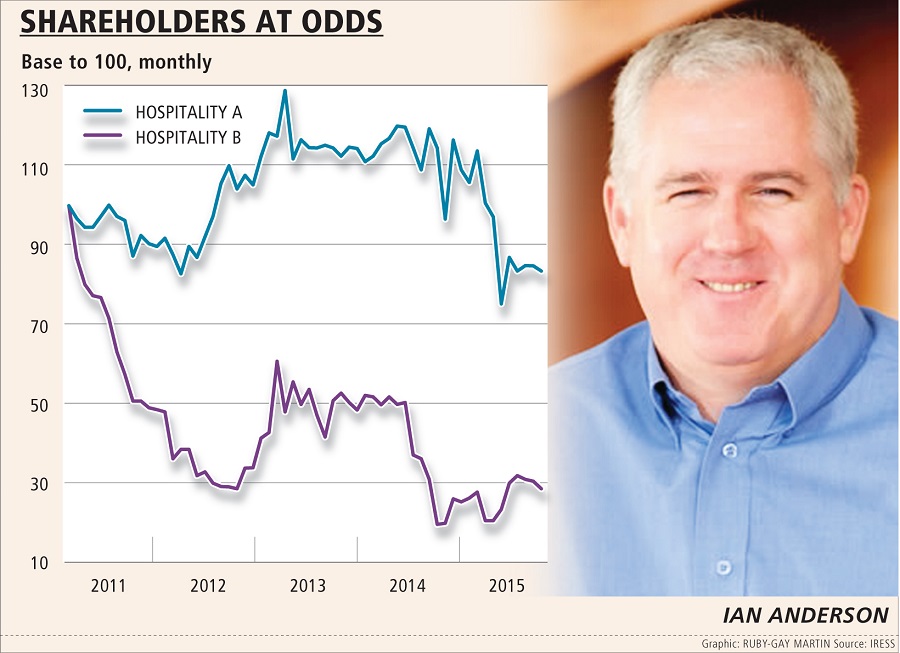TWO minority shareholders have urged Hospitality Property Fund to sweeten the share swap deal that forms part of its turnaround strategy, saying its failure to do so could jeopardise the company’s future.
Grindrod Asset Management chief investment officer Ian Anderson and Steyn Capital Management voiced their concerns on Monday that the existing share swap deal favoured Hospitality’s B unitholders above its A unitholders. They say that A unitholders should receive more B units than have been offered when the controversial A and B unit structures are eventually collapsed into one B unit structure as part of the turnaround strategy.
The dual unit structure was originally developed to offer different risks and rewards for shareholders. Investors who own the less risky A units are paid distributions first, which are capped at consumer price index or 5%, whichever is lower.
The B unitholders receive the balance and have the potential to reap both greater rewards and losses. However, Hospitality has been such a poor performer that the B unitholders have received relatively little income over the years. This together with the costs of managing two listings that share assets has led to the decision to discard the dual structure. Under the existing share swap deal, A unit holders will receive 3.5 B units in Hospitality for each A unit.
Part of the Hospitality restructuring also involves gaming and leisure group Tsogo Sun taking over the real estate investment trust which has performed poorly post the 2010 Soccer World Cup. Tsogo Sun owns a large portion of the B units. It plans to inject 10 hotels into Hospitality, rai sing the group’s asset base from R5bn to R15bn.
“Grindrod and Steyn cannot vote given such relatively small holdings but we can bring the issue to the public’s attention. The firm has been through a difficult time and if the A unitholders decline the share swap agreement and it collapses, the whole company’s future could be in jeopardy,” said Mr Anderson.
“I believe that if an independent expert were to look at the number of As relative to the number of Bs and the inherent risk in the Bs, they would create a more favourable ratio for the As. The Bs are supposed to be the riskier investment also, which receives more volatile returns and the ratio should represent that fact.”
Steyn Capital Management founder Andre Steyn said the share swap deal did not take into account that A unitholders had invested in the specific units because they wanted a lower risk investment. “Suddenly changing the rights of shares which were meant as low-risk, debt-like instruments into more risky equity-like shares is akin to walking into a French restaurant only to be handed a Chinese menu.”
Grindrod owns more than 5% of Hospitality’s A shares while Steyn owns about 1.84%. But the deal is likely to go ahead at the current share swap ratio, according to Brendon Hubbard, a fund manager at ClucasGray, and a B unitholder.
“I have been part of a team of B shareholders which has met regularly with the A share holders and Hospitality.
“We believe we have come to an agreement which will be accepted, the dual structure will end and Tsogo will come in and turn this company around.”
Hospitality management could not be reached for comment at the time of going to press.

Picture: THINKSTOCK
TWO minority shareholders have urged Hospitality Property Fund to sweeten the share swap deal that forms part of its turnaround strategy, saying its failure to do so could jeopardise the company’s future.
Grindrod Asset Management chief investment officer Ian Anderson and Steyn Capital Management voiced their concerns on Monday that the existing share swap deal favoured Hospitality’s B unitholders above its A unitholders. They say that A unitholders should receive more B units than have been offered when the controversial A and B unit structures are eventually collapsed into one B unit structure as part of the turnaround strategy.
The dual unit structure was originally developed to offer different risks and rewards for shareholders. Investors who own the less risky A units are paid distributions first, which are capped at consumer price index or 5%, whichever is lower.
The B unitholders receive the balance and have the potential to reap both greater rewards and losses. However, Hospitality has been such a poor performer that the B unitholders have received relatively little income over the years. This together with the costs of managing two listings that share assets has led to the decision to discard the dual structure. Under the existing share swap deal, A unit holders will receive 3.5 B units in Hospitality for each A unit.
Part of the Hospitality restructuring also involves gaming and leisure group Tsogo Sun taking over the real estate investment trust which has performed poorly post the 2010 Soccer World Cup. Tsogo Sun owns a large portion of the B units. It plans to inject 10 hotels into Hospitality, rai sing the group’s asset base from R5bn to R15bn.
“Grindrod and Steyn cannot vote given such relatively small holdings but we can bring the issue to the public’s attention. The firm has been through a difficult time and if the A unitholders decline the share swap agreement and it collapses, the whole company’s future could be in jeopardy,” said Mr Anderson.
“I believe that if an independent expert were to look at the number of As relative to the number of Bs and the inherent risk in the Bs, they would create a more favourable ratio for the As. The Bs are supposed to be the riskier investment also, which receives more volatile returns and the ratio should represent that fact.”
Steyn Capital Management founder Andre Steyn said the share swap deal did not take into account that A unitholders had invested in the specific units because they wanted a lower risk investment. “Suddenly changing the rights of shares which were meant as low-risk, debt-like instruments into more risky equity-like shares is akin to walking into a French restaurant only to be handed a Chinese menu.”
Grindrod owns more than 5% of Hospitality’s A shares while Steyn owns about 1.84%. But the deal is likely to go ahead at the current share swap ratio, according to Brendon Hubbard, a fund manager at ClucasGray, and a B unitholder.
“I have been part of a team of B shareholders which has met regularly with the A share holders and Hospitality.
“We believe we have come to an agreement which will be accepted, the dual structure will end and Tsogo will come in and turn this company around.”
Hospitality management could not be reached for comment at the time of going to press.
























Change: -1.00%
Change: -1.11%
Change: -1.73%
Change: -0.72%
Change: -1.65%
Data supplied by Profile Data
Change: 0.72%
Change: 0.06%
Change: -1.00%
Change: 0.00%
Change: 0.20%
Data supplied by Profile Data
Change: 0.51%
Change: 0.42%
Change: 0.45%
Change: 0.92%
Change: -0.33%
Data supplied by Profile Data
Change: 0.19%
Change: -0.39%
Change: -0.14%
Change: -0.92%
Change: -0.57%
Data supplied by Profile Data